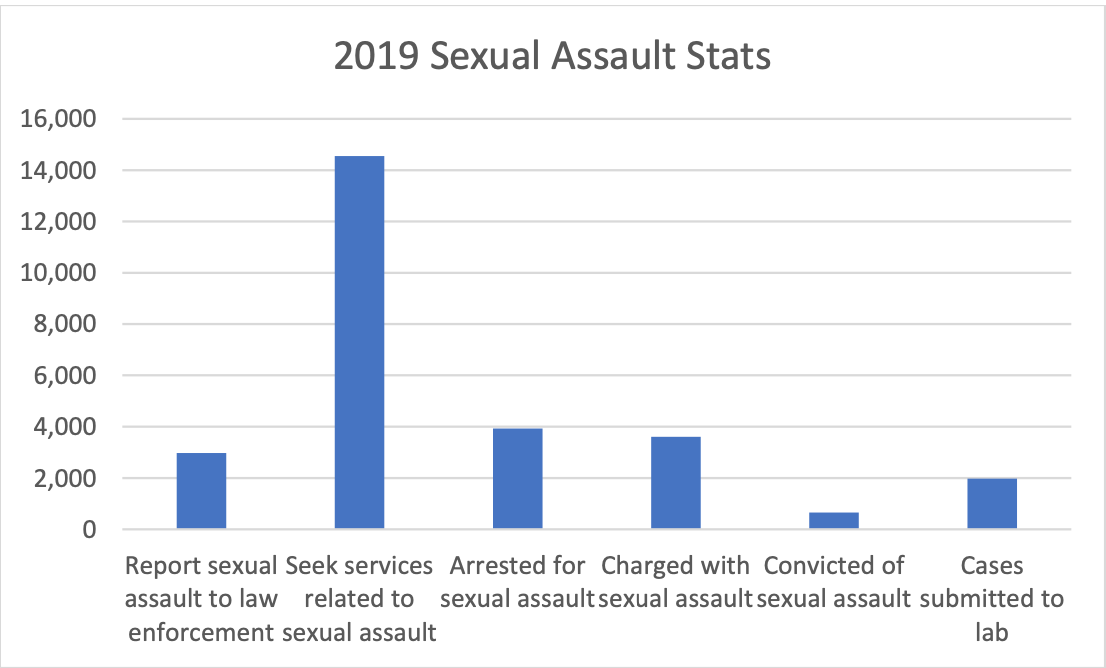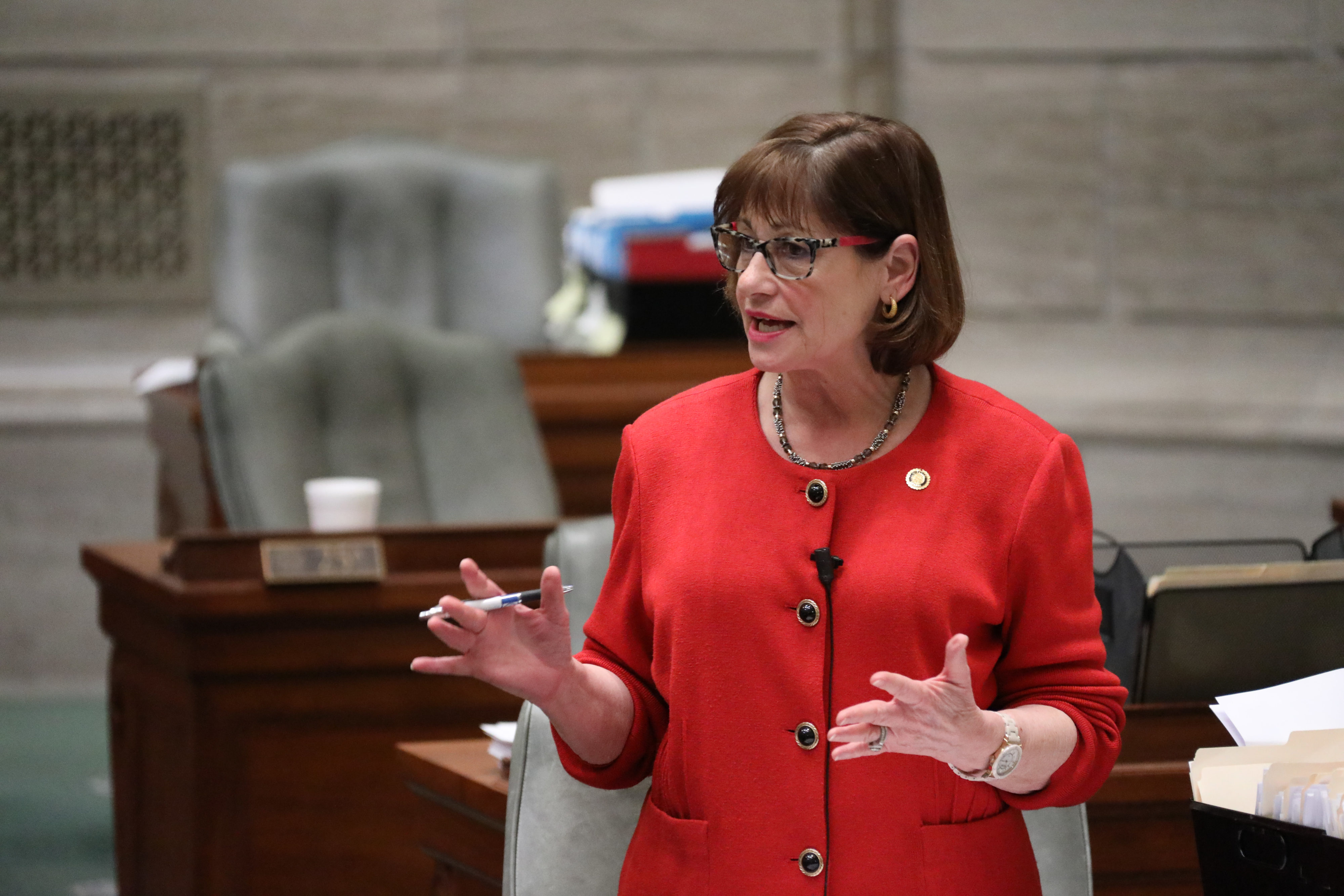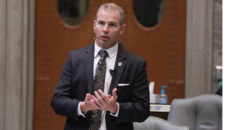“I hope to see a future where the only sad part of a victim story is the event itself and the system has the time to protect the victim at all costs.”
That was the message Casadi Mazurkiewicz gave to the Missouri Rights of Victims of Sexual Assault Task Force in September, and one that is underscored in the group’s report of recommendations to the governor and legislature.
The task force, which met throughout 2021, said Missouri needs to work to ensure victims have access to a Sexual Assault Nurse Examiner (SANE) and are able to properly obtain a medical forensic examination along with diagnostic testing, treatment, and prophylactic needs arising from a sexual assault at no cost.
Missouri also needs to ensure survivors’ privacy in court and other public records, the task force said.
“The task force and its recommendations represent strong bipartisan public policy. A group of committed individuals who stayed focused on the needs of sexual assault survivors can and will make a difference. This work matters and I am hopeful about what we will accomplish,” Jennifer Carter Dochler, the public policy director for the Missouri Coalition Against Domestic and Sexual Violence, said.
Overall, the Missouri Rights of Victims of Sexual Assault Task Force recommended nine proposals in its report given to the governor and legislators:
- “Promote healing for survivors by improving a survivor’s experience through the system response.
- Reduce the number of survivor unmet requests for services from rape crisis centers and increase community awareness of available resources.
- Ensure that survivors throughout the state have access to Sexual Assault Nurse Examiners (SANE), and that survivors are able to obtain a medical forensic exam, along with diagnostic testing, treatment, and prophylactic needs, arising from the sexual assault, and at no cost to the survivor.
- Increase salary and funding to reduce crime laboratory “backlogs” to affect more timely processing of a kit after its delivery.
- Pass an enhanced Sexual Assault Survivors’ Bill of Rights to ensure awareness of survivors’ rights and to guide practitioners in honoring those rights on an individual, local, and statewide basis.
- Increase trauma-informed practices and outreach to underserved populations.
- Modify statutes to further protect survivor privacy in public or court records.
- Review Section 595.220 RSMo and make recommendations for legislative enhancements.
- Stakeholders continue working together to implement these recommendations.”
The report said the Department of Public Safety’s (DPS) SAFE Program should include reimbursements for medical costs stemming from a sexual assault. Now, the program only reimburses for HIV testing as part of a child exam, according to the report.
In order to reduce the number of unmet requests from survivors, the task force recommended increasing the Department of Social Services (DSS) Sexual Violence Support Services line-item. Established in 2014, it was last increased in 2018 and sits at $750,000. The group also suggested rape crisis service centers provide resources for primary and secondary victims, such as family or friends, as well.
Additionally, it recommended increasing the Department of Health and Senior Services (DHSS) budget to expand its Rape and Prevention Education Program.
For every 2 people who received services in 2019, 1 did not because of a lack of resources
In 2019, 2,976 cases of sexual assault in Missouri were reported to law enforcement, 3,926 alleged offenders were arrested, 3,602 people charged with sexual assault, and 1,975 cases were submitted to a laboratory. There were only 654 convictions in 2019, and 14,553 victims of sexual violence sought services related to sexual assault, according to the report.

That same year, 9,057 victims of sexual violence received services — which included support from licensed professional therapists or groups, hotline calls, court advocacy, and more — from the Missouri Coalition Against Domestic and Sexual Violence (MOCADSV). However, there were nearly 5,500 people who could not receive survivors because of a lack of resources.
Most of the individuals who received services were women (5,871) and children (2,154). Data also showed 59 percent of the survivors who received services were white; only 19 percent were Black, 14 percent were unknown, and 3 percent were Hispanic or Latino.
The task force said it specifically focused on adult sexual assault survivors who can often inadvertently be overlooked.
The 36-page report also included a special message for survivors of sexual violence: “We see you. We hear you. We are committed to improving Missouri’s response to sexual assault survivors as the burden should not be on you.”
Pre-filed legislation would create a Sexual Assault Survivors’ Bill of Rights

The Missouri Rights of Victims of Sexual Assault Task Force was created through SB 569, a bipartisan omnibus bill signed into law in 2020. Aside from the task force, it also created a streamlined process for testing rape kits, created a statewide telehealth network to increase access to SANE professionals, and established a Sexual Assault Survivors’ Bill of Rights.
However, that “bill of rights” is held up in court over a challenge to a provision that included public defenders.
Sen. Jill Schupp, who was instrumental in attaching the telehealth provision to the original bill, has pre-filed legislation that would create a revised Sexual Assault Survivors’ Bill of Rights. It was one of the first bills pre-filed this year.
Her SB 640 would maintain victims have a right to consult with an employee or volunteer at a rape crisis center, be interviewed by law enforcement officers or examined by medical professionals of the gender of their choosing, and be assigned an interpreter if needed as reasonably available. It would also maintain survivors be notified about the evidence tracking system and the right to certain information considered a closed record.
Schupp’s bill would require medical providers, law enforcement officers, and prosecuting attorneys to notify survivors “in a timely manner” of their rights.
The task force recommended DPS coordinate with stakeholders — which would include law enforcement, attorneys, medical providers, rape crisis center representatives, Missouri Hospital Association representatives, and Missouri State Highway Patrol crime laboratory director or designee — to create a finalized and revised Sexual Assault Survivors’ Bill of Rights.
Additionally, the group noted victims of sexual violence can often experience unique barriers to reporting an assault, such as concerns about confidentiality, embarrassment, and fear of not being believed.
It recommended expanding Missouri’s rape shield law to include any portion of the criminal justice process when a victim might be called to testify. It also suggested Missouri statute be amended so intimate details and personally-identifying information be redacted in records.
The task force included Sens. Holly Rehder and Jill Schupp, Reps. David Evans and Yolanda Young, Missouri State Highway Patrol Colonel Eric Olson, Missouri State Highway Patrol Crime Lab Deputy Director Stacey Bollinger, Missouri Office of Prosecution Services Special Victims Resource Prosecutor Catherine Vannier, DHSS representative Sarah Ehrhard Reid, Missouri Hospital Association representative Amy Schwartz, Metropolitan Organization to Counter Sexual Association President and CEO Julie Donelon, YWCA St. Joseph CEO Tammy Killin, St. Joseph Police Department Sgt. Jason Strong, and Missouri Kids First Executive Director Jessica Seitz.

Kaitlyn Schallhorn was the editor in chief of The Missouri Times from 2020-2022. She joined the newspaper in early 2019 after working as a reporter for Fox News in New York City.
Throughout her career, Kaitlyn has covered political campaigns across the U.S., including the 2016 presidential election, and humanitarian aid efforts in Africa and the Middle East.
She is a native of Missouri who studied journalism at Winthrop University in South Carolina. She is also an alumna of the National Journalism Center in Washington, D.C.
Contact Kaitlyn at kaitlyn@themissouritimes.com.













































